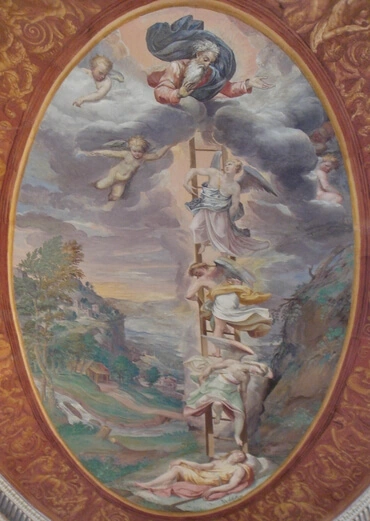1
Potom mluvil Bůh k Jákobovi: Vstana, vstup do Bethel, a bydli tam; a udělej tam oltář Bohu silnému, kterýž se ukázal tobě, kdyžs utíkal před Ezau bratrem svým.
2
Tedy řekl Jákob čeládce své, a všechněm, kteříž s ním byli: Odvrzte bohy cizí, kteréž máte mezi sebou, a očisťte se, a změňte roucha svá.
3
A vstanouce, vstupme do Bethel, a udělám tam oltář silnému Bohu, kterýž vyslyšel mne v den ssoužení mého, a byl se mnou na cestě, kterouž jsem šel.
4
Tedy dali Jákobovi všecky bohy cizí, kteréž měli, i náušnice, kteréž byly na uších jejich; i zakopal je Jákob pod tím dubem, kterýž byl u Sichem.
5
I brali se odtud. (A byl strach Boží na městech, kteráž byla vůkol nich, a nehonili synů Jákobových.)
6
Tedy přišel Jákob do Lůz, kteréž jest v zemi Kananejské, (to již slove Bethel,) on i všecken lid, kterýž byl s ním.
7
I vzdělal tu oltář, a nazval to místo Bůh silný Bethel; nebo tu se mu byl zjevil Bůh, když utíkal před bratrem svým.
8
Tehdy umřela Debora, chovačka Rebeky, a pochována jest pod Bethel, pod dubem; i nazval jméno jeho Allon Bachuth.
9
Ukázal se pak opět Bůh Jákobovi, když se navracoval z Pádan Syrské, a požehnal mu.
10
I řekl jemu Bůh: Jméno tvé jest Jákob. Nebude více nazývano Jméno tvé toliko Jákob, ale Izrael také bude Jméno tvé. Protož nazval Jméno jeho Izrael.
11
Řekl ještě Bůh jemu: Já jsem Bůh silný všemohoucí; rostiž a množ se; národ, nýbrž množství národů bude z tebe, i králové z bedr tvých vyjdou.
12
A zemi tu, kterouž jsem dal Abrahamovi a Izákovi, tobě ji dám; semeni také tvému po tobě dám tu zemi.
13
I vstoupil od něho Bůh z místa, na kterémž mluvil s ním.
14
Jákob pak vyzdvihl znamení pamětné na místě tom, na kterémž mluvil s ním, sloup kamenný; a pokropil ho skropením, a svrchu polil jej olejem.
15
A nazval Jákob jméno místa toho, na kterémž mluvil s ním Bůh, Bethel.
16
I brali se z Bethel, a bylo již nedaleko do Efraty. I porodila Ráchel, a těžkosti trpěla roděci.
17
A když s těžkostí rodila, řekla jí baba: Neboj se, nebo také tohoto syna míti budeš.
18
I stalo se, když k smrti pracovala, (nebo umřela), nazvala jméno jeho Ben Oni; ale otec jeho nazval ho Beniaminem.
19
I umřela Ráchel, a pochována jest na cestě k Efratě, jenž jest Betlém.
20
A postavil Jákob znamení pamětné nad hrobem jejím; toť jest znamení hrobu Ráchel až do dnešního dne.
21
I odebral se odtud Izrael, a rozbil stan svůj za věží Eder.
22
Stalo se pak také, když bydlil Izrael v té krajině, že Ruben šel, a spal s Bálou, ženinou otce svého; o čemž uslyšel Izrael. Bylo pak synů Jákobových dvanácte.
23
Synové pak Líe: Prvorozený Jákobův Ruben, potom Simeon, a Léví, a Juda, a Izachar, a Zabulon.
24
Synové Ráchel: Jozef a Beniamin.
25
A synové Bály, děvky Ráchel: Dan a Neftalím.
26
A synové Zelfy, děvky Líe: Gád a Asser. Tiť jsou synové Jákobovi, kteříž mu zrozeni jsou v Pádan Syrské.
27
Tedy přišel Jákob k Izákovi otci svému do Mamre, do města Arbe, jenž jest Hebron, kdežto bydlil pohostinu Abraham a Izák.
28
A bylo dnů Izákových sto osmdesáte let.
29
I dokonal Izák, a umřel, a připojen jest k lidu svému, stár jsa a plný dnů; i pochovali ho Ezau a Jákob, synové jeho.







